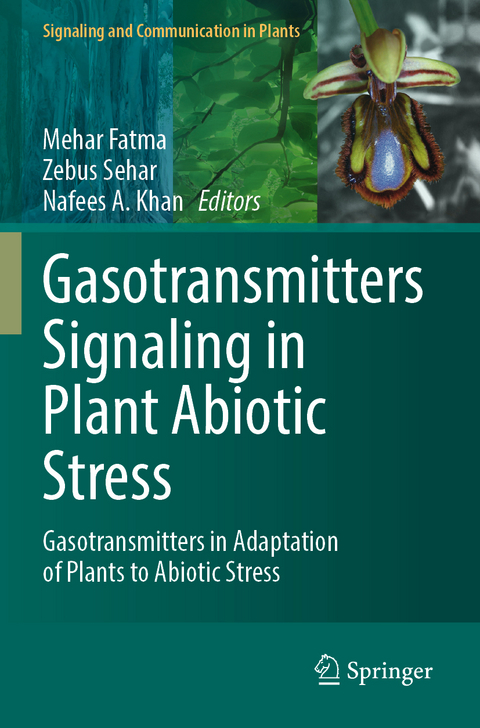
Gasotransmitters Signaling in Plant Abiotic Stress
Springer International Publishing (Verlag)
978-3-031-30860-4 (ISBN)
This book deals with the gasotransmitters signaling in redox reactions and homeostasis for the adaptation of plants to unfavorable abiotic stress environments. There are lots of interesting chapters in this book that cover both research and educational objectives. This book serves as a reference illustrated book for all who are interested in the regulation of gasotransmitters and redox homeostasis in agriculture. Maintenance of redox homeostasis strengthens the potentiality of plants to resist abiotic stress conditions through the enhanced antioxidant system and the subsequent impact on other signaling molecules. The book presents novel outcomes and implications in plant biology concerning the study of different types of gasotransmitters signaling such as nitric oxide (NO), ethylene, hydrogen sulfide (H2S), etc. under diverse abiotic stresses in one place. The chapters of the book discuss the recent progress and current perspectives on the role of gasotransmitters relevance to plant functions and adaptations to abiotic stresses, the influence of gasotransmitters on the physiology of plants with respect to abiotic stress tolerance, gasotransmitters and omics for abiotic stress tolerance, advancement in the biology of gasotransmitters in regulating salinity and drought stress response in plants, new insights of gasotransmitters and cellular redox homeostasis in plants and the chapter also deliberate the emerging role of gasotransmitters in regulating redox homeostasis for plant stress management. This book is the first comprehensive book covering all aspects and advancements in the biology of gasotransmitters in redox homeostasis conferring different abiotic stress tolerance, from which readers from all backgrounds can get benefitted. This book will appeal to researchers, students, scientific societies, agriculturists, etc.
Prof. Nafees A. Khan is Professor in Department of Botany, Aligarh Muslim University, Aligarh. He did his Ph.D and D.Sc from Aligarh Muslim University, Aligarh. He has about 30 years of teaching experience ande has successfully guided 37+ M.Sc. dissertation and supervised 20 Ph.D. theses. He has been recognized as Highly Cited Researcher-2019 and 2020 (Web of Science), Eminent Scientist Award 2019 by Samagra Vikas Welfare Society, Lucknow, UGC Research Award 2005 and UGC Mid-Career Award-2018 and many more. He is Fellow of Linnean Society of London, Indian Society of Plant Physiology, and Indian Botanical Society. He has successfully completed or ongoing 9 research projects as Principal Investigator mainly involving gasotransmitters and has published more than 164 papers in peer reviewed international journals. He is an editorial member in several peer reviewed journals. He has edited several books published from Springer, Elsevier, NOVA, CRC Pressand others.
Dr. Mehar Fatma is Assistant Professor in Department of Botany, Aligarh Muslim University, Aligarh. She did her M.phil and Ph.D from Aligarh Muslim University, Aligarh and then she completed her Post-doc as Principal Investigator from Jawaharlal Nehru University, New Delhi (NPDF-SERB, DST-New Delhi and DSKPDF, UGC-New Delhi). During her Ph.D, she received the INSPIRE Fellowship from DST-New Delhi for the first rank holder and bagged University Gold medal. She also got the prestigious MANF National Fellowship from UGC-New Delhi during her M.Phil and Merit Scholarship in masters as a meritorious student. She has more than 26 peer reviewed international publications and has attended conferences and seminars. She also visited Edinburgh, Scotland and presented her research paper. Her research papers have lots of citation and have high impact factor. She is also life member of Indian Society for Plant Physiology and Indian Botanical Society andreview editor for the Journal of Frontiers in Agronomy.
Dr. Zebus Sehar did her Masters and Ph.D from Aligarh Muslim University, Aligarh and then she worked as a Senior Research Fellow in a CSIR-funded research project with Prof. Nafees A. Khan in the Department of Botany, Aligarh Muslim University, Aligarh. During her Ph.D she received the Fellowships for meritorious student. She has several research publications in high Impact Factor peer reviewed international journals. She is also life member of National Environmental Science Academy (NESA), and recipient of Junior Scientist Award of NESA.
Gasotransmitters signaling in plants under abiotic stress: An overview.- Influence of gasotransmitters on the physiology of plants with respect to abiotic stress tolerance.- Gasotransmitters and omics for abiotic stress tolerance in plants.- Advancement in the biology of gasotransmitters: H2S, NO, and ethylene.- Hydrogen sulfide: An evolving gasotransmitter regulating salinity and drought stress response in plants.- Ethylene synthesis and redox homeostasis in plants: Recent advancement.- Nitric oxide and cellular redox homeostasis in plants.- The function of hydrogen sulfide in plant responses to salinity and drought: new insights.- Hydrogen peroxide and its role in abiotic stress tolerance in plants.- Interaction of ethylene and H2S in plant stress management.
| Erscheinungsdatum | 12.06.2024 |
|---|---|
| Reihe/Serie | Signaling and Communication in Plants |
| Zusatzinfo | XIV, 221 p. 20 illus., 16 illus. in color. |
| Verlagsort | Cham |
| Sprache | englisch |
| Maße | 155 x 235 mm |
| Themenwelt | Naturwissenschaften ► Biologie ► Botanik |
| Weitere Fachgebiete ► Land- / Forstwirtschaft / Fischerei | |
| Schlagworte | abiotic stress • Ethylene • gasotransmitters • Hydrogen sulfide • Nitric oxide • Redox-homeostasis • sustainable development |
| ISBN-10 | 3-031-30860-3 / 3031308603 |
| ISBN-13 | 978-3-031-30860-4 / 9783031308604 |
| Zustand | Neuware |
| Haben Sie eine Frage zum Produkt? |
aus dem Bereich


